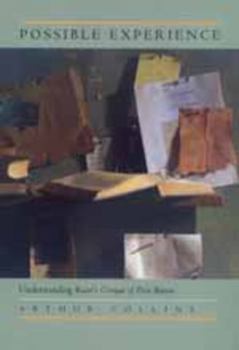Possible Experience: Understanding Kant's Critique of Pure Reason
Select Format
Select Condition 
Book Overview
Arthur Collins's succinct, revisionist exposition of Kant's Critique of Pure Reason brings a new clarity to this notoriously difficult text. Until recently most readers, ascribing broadly Cartesian assumptions to Kant, have concluded that the Critique advances an idealist philosophy, because Kant calls it "transcendental idealism" and because the work abounds in apparent confirmations of that interpretation.
Collins maintains...
Format:Paperback
Language:English
ISBN:0520214994
ISBN13:9780520214996
Release Date:February 1999
Publisher:University of California Press
Length:219 Pages
Weight:0.80 lbs.
Dimensions:0.8" x 5.9" x 9.0"
Customer Reviews
4 ratings
Proper Reading of The First Critique
Published by Thriftbooks.com User , 19 years ago
This writing is essential to the understanding of Kant's First Critique. It exposes the misunderstandings that have occurred between transcendental idealism and transcendental realism. In fact, Collins shows that Kant's views are almost diametrically opposed to the views of transcendental realists, such as Berkeley and Descartes. The role that the forms of space and time play in perception and the proper application of the Categories to enduring spatial objects are clearly set forth. Collins makes it clear that the search for the truly objective foundations of knowledge took a wrong turn with Descartes and that this view has persisted, tenaciously, to this day. Object knowledge, according to Collins, comes from the proper application of the Categories to enduring spatial objects and not to the perceptions of the inner sense, which are transient. Grounded on the Cartesian model are all forms of rational psychology, which are effectively refuted by this thoughtful examination. Such a treatise could not be more relevant, given today's tendencies towards these various forms of rational psychology.
Quite revolutionary - if correct!
Published by Thriftbooks.com User , 21 years ago
It surprises me that more of a noise hasn't been made about this book. The idea is that Kant wasn't any kind of idealist, didn't develop his stance from what has been called the "methodological solipsist" point of view characteristic of so much of the modern philosophy that followed Descartes. Anybody who's ever been puzzled by the cognitive dissonance between Kant's constant disavowals of idealism and (what looks like) the blatant idealism saturating his writing, will find this book an intellectual relief, for Collins, more than any other commentator on Kant I've ever read, makes sense of this (apparent) paradox.So far as I can see, Collins' argument is pretty coherent (it would take a better thinker than me to sort it out), but if it's true, it knocks the bottom out of just about every interpretation of Kant, critique of Kant, departure from Kant, or development of Kant, since Kant.Maybe that's the problem - too many textbooks, lecture notes, etc., would have to be rewritten. Too much egg on too many faces. (Too much egg to be applied posthumously too - after reading Collins on Kant, one can no longer read any of the German Idealists with a straight face.)
almost gave it 5 stars
Published by Thriftbooks.com User , 22 years ago
In addition to Allison's book on Kant's T.I., I recommend this work. While I think it is a bit too dogmatic in its defense of Kant, Collins has many points of merit. Off the bat, I appreciated the title, Possible Experience, as the fact that Kant defines a phenomenon as an object of possible experience, and not of subjective perception in a Berkeleian manner, seems to have been forgotten by most Kant critics. Collins' major argument is that Kant does not begin from a Cartesian skeptical stance on the existence of an outer world, but rather attempted to refute skepticism. In addition to refuting skepticism, Kant also attempted to refute its close friend, idealism. Collins attempts an interpretation of Kant which takes seriously Kant's claim that he opposed idealism and skepticism, and thus Collins' major task is to illustrate the differences between idealism and Kant's transcendental or "critical idealism." To a large degree, I think Collins succeeds, but he sometimes goes too far in defense of certain statements of Kant which are at least so absentminded that they deserve no defense. Overall though, a good readable work.
Confusions of 'Idealism'
Published by Thriftbooks.com User , 23 years ago
One of the great confusions of philosophic language is the term 'idealist', and one who suffers from it the most is the philosopher Kant. In a relatively brief and extremely clear commentary on the Critique of Pure Reason Collins attempts to set the record straight by an exposition of Kant's unique juxtaposition of 'transcendental idealism' and 'empirical realism'. This confusion began early, and has persisted, and one must wonder if the term 'transcendental idealism' can ever escape its history and find its real home in the language of 'possible experience'. One observes the many debates where the suggestions and insights of Kant might assist the clarification of issues gone metaphysically berserk, only to find discussion clipped by the muttering charges of 'idealism'. And that is a loss to the evolution of cultural thought, if it can be called that, as it endlessly recycles the elemenatary errors Kant was at pains to debrief. Hopefully, Collins' work can perform emergency ambulance service here in some aspiration to recover our own cultural belongings from oblivion.






